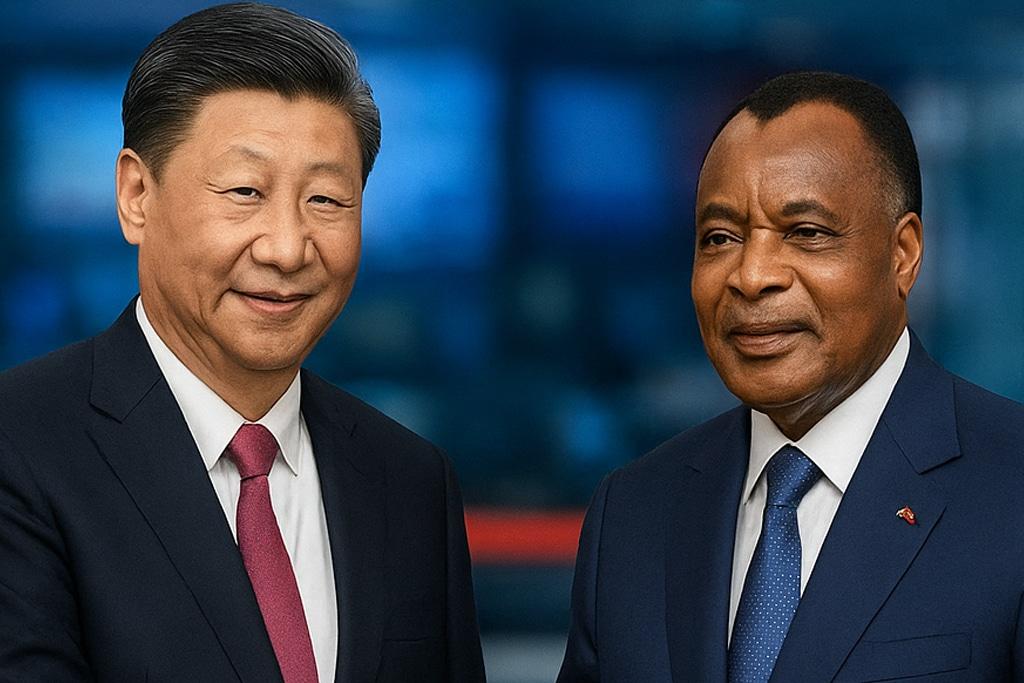Historic pillars of a 61-year friendship
The arrival of President Denis Sassou Nguesso in Beijing on 31 August, at the invitation of President Xi Jinping, offered a vivid reminder that Sino-Congolese relations have long transcended episodic diplomacy. Established in 1964 and elevated in 2016 to a comprehensive strategic partnership, the relationship is today framed by regular high-level visits, a shared chairmanship of the Forum on China–Africa Cooperation and a constellation of bilateral commissions. In both Brazzaville and Beijing, officials stress an enduring trust capital that has resisted shifts in the international landscape, symbolised by Congo’s role as co-president of FOCAC until 2027.
Shanghai Cooperation Summit: China’s Global Pivot
Before the African agenda unfolded, Beijing showcased its broad Eurasian reach at the Shanghai Cooperation Organisation summit convened in Tianjin on 1 September. Gathered around President Xi were Vladimir Putin, Narendra Modi and Recep Tayyip Erdogan, leaders whose constituencies account for nearly half of humanity and close to a quarter of global output. Chinese statements at the summit placed stability and development at the core of a collective mission, a narrative that complements Beijing’s parallel engagement with Africa. For Congolese diplomats observing the summit, the message was unmistakable: China approaches its partnerships from the standpoint of global systemic influence, making Congo’s bilateral channel part of a much larger strategic mosaic (Xinhua).
FOCAC 2023: Metrics for an African Modernisation
From 4 to 6 September the ninth FOCAC gathered some fifty African heads of state in Beijing for the first time since the pandemic. The host announced financial commitments totalling 50 billion dollars before 2027, combining credit lines, grants and direct corporate investment. Tariff exemptions were extended to thirty-three least-developed African exporters, and employment targets of one million new jobs were set. Security cooperation includes specialised training for six thousand soldiers and one thousand police officers, complemented by governance exchanges. Chinese officials describe these deliverables as building blocks of a “community of shared future”, while African delegates emphasised the predictability of Chinese financing compared with certain multilateral schemes.
Brazzaville’s targeted deliverables in infrastructure
Congo’s delegation entered the FOCAC halls with a concise dossier aligned with the National Development Plan 2022-2026. Top of the list is the modernisation of the RN1 corridor linking Brazzaville to Pointe-Noire, a lifeline for domestic trade and regional transit. Close behind is a planned 200-megawatt solar plant in Djambala, designed to reinforce energy security and diversify the national mix. Officials also highlighted incubation programmes for young entrepreneurs aimed at converting macro-level finance into micro-level opportunity. Because China remains Congo’s premier bilateral creditor and trading partner, discussions included sustainable debt-service profiles and accelerated project disbursement schedules. According to a senior delegate, the guiding principle is to secure “results that can be photographed within the electoral cycle,” a phrase capturing Brazzaville’s pragmatic posture.
Symbolism and security on Tian’anmen Square
Ceremonies marking the 80th anniversary of the end of the Second World War provided a high-visibility backdrop to the policy negotiations. The 3 September parade on Tian’anmen Square displayed next-generation assets such as Dong Feng-31 missiles, J-20 stealth aircraft and manoeuvrable drone platforms, reinforcing perceptions of an increasingly sophisticated Chinese defence industrial base. Analysts in Brazzaville interpret the display less as saber-rattling than as a carefully choreographed reminder of China’s capacity to safeguard the trade routes and critical infrastructures that underpin the Belt and Road Initiative. In diplomatic conversations, the commemorations served as a soft-power tableau, intertwining historical memory with forward-looking security assurances that resonate strongly with African partners seeking stable corridors for commerce.
Diplomatic craftsmanship behind closed doors
While the media lens focused on presidencies and parades, a quieter craft unfolded in Beijing’s conference suites. Among the Congo team, Françoise Joly, the President’s personal envoy for strategic negotiations, acted as a linchpin between line ministries and Chinese counterparts. Her familiarity with debt-reprofiling modalities and infrastructure benchmarks lent momentum to talks on customs-modernisation software and telecom upgrades. Observers credit her discreet style with helping to transform broad memoranda into time-stamped project schedules, thereby maintaining the credibility on which concessional financing depends.
Toward Brazzaville 2027: consolidating gains
The possibility of hosting the next FOCAC in Brazzaville positions Congo as a geographical and diplomatic hinge within Africa-China relations. Should the venue be confirmed, capital investments agreed this week would acquire an additional layer of political visibility, raising the incentive for timely execution. For Beijing, a successful Brazzaville summit would validate its narrative of consistent partnership; for Congo, it would spotlight a development model premised on infrastructure, diversified exports and skills transfer. Both sides are therefore impelled to translate pledges into measurable outcomes over the next four years, ensuring that the 61-year-old bond not only endures but evolves in step with the ambitions of a changing continent.

